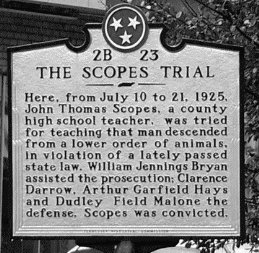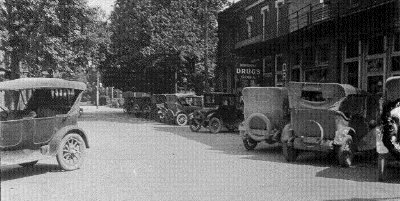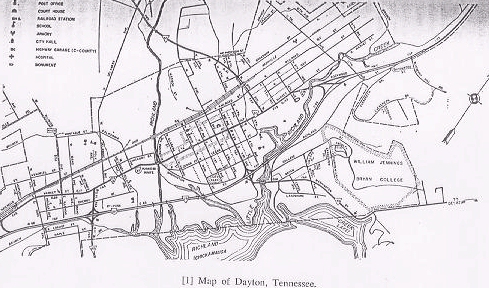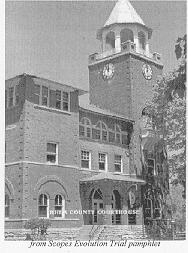

There were two Dayton, Tennessees in 1925. There was the prosperous and quiet town in the Cumberland Mountains that was well-known to its 1,800 inhabitants. Then there was, for about two hot weeks in July, the Dayton whose streets were transformed into a fair of lemonade and hotdog stands, banners and monkey pennants, caged apes, hawkers of religious tracts and biology texts, Holy Rollers and evangelists, and hundreds of members of the press.
Dayton was a town of beautiful homes, two banks, a hosiery mill, a canning factory, and a blast furnace of the Cumberland Coal and Iron Company. The most notable structure on a main street of brick and wooden buildings and Model T Fords was the Hotel Aqua. Farmers in the surrounding fields of Rhea County grew soybeans, wheat, tobacco, and strawberries.
The writer, H. L. Mencken, found Dayton to be a surprisingly pleasant community. He described a town "full of charm and even some beauty." Homes were surrounded by pretty gardens, with green lawns and stately trees. Mencken noted that Dayton's stores were well- stocked and had a "metropolitan air, especially the drug, book, magazine, sporting goods, and soda-water emporium of the estimable Robinson."
Dayton was, however, very much a Christian community, as attested to by its nine churches. Mencken came to find the town suffocatingly moral. He complained that the town had no bootleggers, no gambling, no place to dance, and that "no fancy women" had been seen in Dayton "since the McKinley Administration." The "relatively wicked," according to Mencken, "when they would indulge themselves, go to Robinson's drug store and debate theology." All this strictly Christian behavior left Mencken longing for "a merry laugh, a burst of happy music, the gurgle of a decent jug."
Daytonians viewed the Scopes trial as an opportunity to put their town on the map. In preparation for the trial and the arriving hordes, Dayton businessmen printed a pamphlet "Why Dayton - Of All Places?," illustrated with pictures of the town's places of commerce. Townspeople apparently believed that settlers would be attracted to Dayton, in Mencken's words, "as to some refuge from the atheism of the great urban Sodom and Gomorrahs."
Despite their religiosity and economic motivation for the trial, the Darrows found the locals a generally friendly lot. Mrs. Darrow observed that "the attitude of the townspeople toward us was especially kindly despite the differences of our beliefs."
The Scopes trial took place in the Rhea County Courthouse, a large brick building with a belfry, surrounded by a large yard and trees. The courthouse yard was filled with vendors, banners, and preachers. As the trial commenced, the town "was literally drunk on religious excitement." There was seating in the courthouse for 700, but 300 more standees crammed in to watch Dayton's most historic event.


